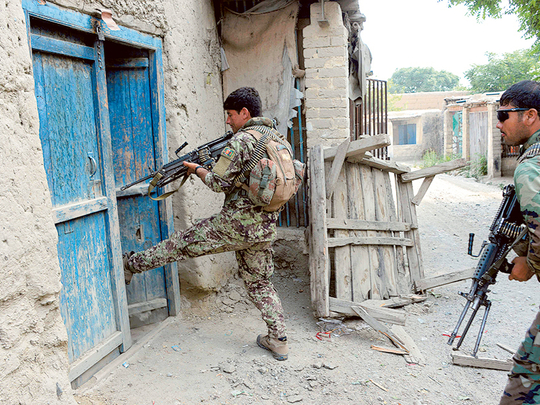
Kabul: Afghanistan troops killed 122 Daesh militants after the group claimed responsibility for the country’s deadliest single attack in 15 years over the weekend, according to the nation’s Interior Ministry.
In the past 24 hours, Afghanistan security forces assaulted the insurgents in the eastern province of Nangarhar, killing a deputy military commander and arresting 20 others, according to a statement sent by the ministry Tuesday.
On Saturday, more than 80 people were killed and another 231 were wounded when suicide bombers triggered two explosions at a rally by hundreds of ethnic Hazaras in Kabul. The attacks shattered claims by President Ashraf Gani made four months ago that Daesh had been wiped out in Afghanistan.
Daesh is threatening more attacks against Afghanistan’s Hazara minority after Saturday’s suicide blasts in Kabul that killed 80 people.
But assessing the threat from Daesh is difficult. Some officials question whether an ultra-radical Sunni movement largely confined to an area near the border with Pakistan can sustain more attacks.
Omar Khorasani, a Daesh commander, said Saturday’s bombing at a rally by thousands of Hazara protesting about the route of a new power line was in retaliation for the support offered by some Hazara to the regime in Syria.
Many Hazara have gone through Shiite-governed Iran to fight for the Syrian government of President Bashar Al Assad, a fellow Shiite, against Daesh. “Unless they stop going to Syria and stop being slaves of Iran, we will definitely continue such attacks,” he told Reuters via telephone from an undisclosed location.
“We can and we will strike them again,” he added.
The government says it has been hitting Daesh hard even before Saturday’s blasts in Kabul, one of the most deadly in the country since the start of the Taliban insurgency in 2001.
Risk of sectarian strife
It said government forces had killed hundreds of insurgents in the past two months in assaults on Daesh strongholds in the eastern province of Nangarhar, which straddles the highway from Kabul to the Pakistani city of Peshawar.
According to Afghanistan’s interior ministry, 654 Daesh and Taliban fighters, including several senior commanders, have been killed there.
Nevertheless, Saturday’s attack by Daesh on the Shiite minority adds a dangerous complication to the war the Western-backed government in Kabul has been fighting with Taliban insurgents.
As well as the risk of dragging Afghanistan into Daesh’s wider campaign in the Middle East, it raised the spectre of sectarian violence, something Afghanistan, a majority Sunni country, has largely been spared during decades of war.
But while seeing the threat, officials are cautious about whether the attack represents a real turning point for Daesh, which has been under heavy pressure this year from both US air strikes and an Afghan ground offensive.
“Having a couple of people that you’ve hired put on a suicide vest and sneak into a crowd of many thousands really is not that sophisticated,” said US military spokesman Brig. Gen. Charles Cleveland.
On the ground, the Nato-led coalition advising government forces estimates the number of Daesh fighters at between 1,000-3,000, many of them former members of militant groups like the Taliban Movement of Pakistan (TTP), the Islamic Movement of Uzbekistan or the Afghan Taliban itself.












